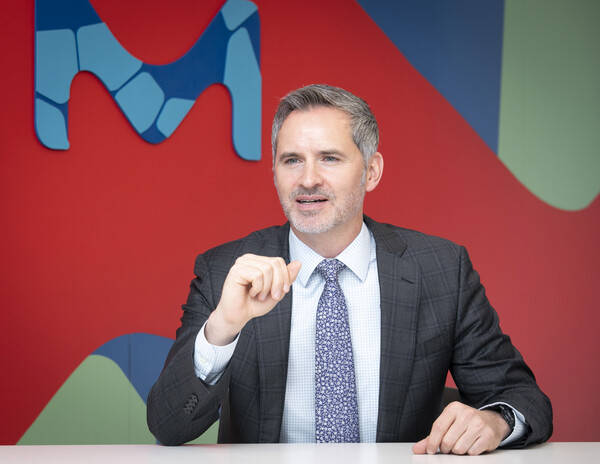In a recent interview with Korea Biomedical Review, Christoph Hamann, General Manager of Merck Biopharma Korea, reflected on his two-year tenure and shared insights into the company's achievements, challenges, and future vision.

Despite external headwinds such as the ongoing government-doctor dispute over increasing medical school admission quotas, Hamann is proud of the progress his team has made in improving access to Merck’s innovative therapies.
“We have worked hard to ensure that many of our medicines can reach the patients who need them most in Korea,” he said, emphasizing the collective effort that drove success across key therapeutic areas such as oncology and fertility.
In fertility care, Merck achieved a significant milestone by expanding access to Pergoveris injection, a treatment for infertility caused by luteinizing hormone (LH) and follicle-stimulating hormone (FSH) deficiencies.
Hamann highlighted the importance of this achievement, particularly for women over the age of 35, who form the majority of infertility patients in Korea.
“With Korea facing the world’s lowest birth rate of 0.72, helping patients achieve their dream of starting a family is a priority for us,” Hamann said. “Through science and awareness initiatives, we aim to address Korea’s population crisis while fostering a family-friendly work culture.”
In oncology, Merck has seen notable success with key products such as Erbitux and Tepmetko. The third RSA (risk-sharing agreement) renewal for Erbitux last year ensured continued access to the drug, while this year saw the expansion of reimbursement for combination therapy involving Erbitux and Encorafenib to treat BRAF V600E-mutant metastatic colorectal cancer.
Hamann also celebrated Tepmetko’s approval by Korea’s Oncology Drug Advisory Committee, following three attempts to gain recognition. Designed for lung cancer patients with MET exon 14 skipping mutations—a group with extremely low survival rates—Tepmetko represents a critical treatment option.
“This milestone underscores the urgent need for therapies that address unmet clinical needs. While challenges remain, we are hopeful for reimbursement next year,” Hamann said.
Highlighting Merck Korea’s success in immunotherapy, Hamann pointed to the strong performance of Bavencio, which has become the first-line maintenance therapy for locally advanced or metastatic urothelial carcinoma.
Clinical data, including the JAVELIN Bladder 100 trial, demonstrated that Bavencio can extend overall survival to approximately 30 months, a significant improvement for bladder cancer patients. Real-world data in Korea further supports these findings, reflecting improved progression-free survival and quality of life.
Hamann also addressed the broader challenges facing Korea’s healthcare system, particularly regarding access to new medicines.
He cited the lengthy reimbursement process, which takes an average of 46 months in Korea compared to 17 months in Japan and 11 months in Germany.
“While Korea’s healthcare infrastructure is outstanding, the lower reimbursement rate for new drugs compared to other advanced nations remains a major barrier,” the Korean GM said. “This could severely impact patient quality of life, especially as the population ages rapidly.”
There is a need for sustained collaboration between the government, healthcare professionals, and pharmaceutical companies to accelerate access to innovative therapies while balancing budget constraints, he added.
Looking ahead, Hamann outlined three key priorities for Merck Biopharma Korea -- achieving reimbursement for all remaining products, addressing Korea’s population crisis by leading initiatives to support family-friendly workplace policies, and continuing to advocate for improved access to new drugs.
“We aspire to be a leader in specialty care while positively impacting Korean patients’ lives,” he concluded.
As Merck Biopharma Korea celebrates its achievements, Hamann remains optimistic about the company’s role in addressing healthcare challenges, driving innovation, and contributing to Korea’s evolving medical landscape.
Related articles
- Merck's Tepmetko, GSK-Janssen's Vocabria+Rekambys combo move closer to reimbursement in Korea
- Merck Biopharma Korea wins health ministry award for family-friendly initiatives
- Tepmetko, Jemperli, and Neulasta pass cancer review panel to move closer to reimbursement
- Merck presents RWE study of multiple sclerosis drug Mavenclad in Koreans
- Merck Biopharma's Bavencio changes urothelial carcinoma treatment paradigm in Korea
- ‘Merck, the oldest pharma company, leads innovation, standard of care’
- Merck Biopharma Korea promotes gender equality and work-life balance on Women's Day
- Merck’s Tepmetko wins reimbursement in Korea after 3.5 years, expanding access for lung cancer patients with rare MET mutation
- Merck rebrands Korean unit as Merck Healthcare Korea to highlight patient-centrered healthcare

